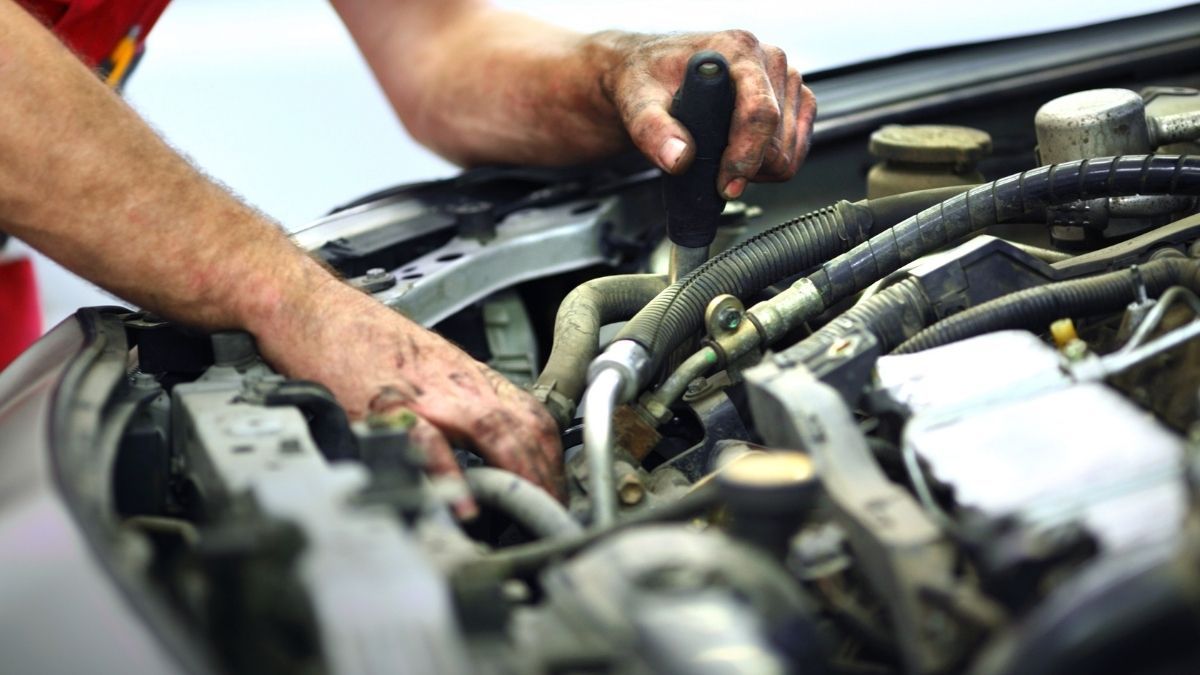The cost to fix reduced engine power will vary depending on the underlying cause. If it is due to a simple issue like dirty fuel injectors, the cost may be as low as $100. However, if the problem is caused by something more serious like a faulty turbocharger, the cost could be several thousand dollars.
If your car’s “reduced engine power” warning light is on, it means your vehicle has detected a problem and is limiting its performance to prevent further damage. But what exactly does that mean? And how much will it cost to fix?
Here’s what you need to know about reduced engine power warnings, including what they mean and an estimate of the repair costs.
What Does Reduced Engine Power Mean?
A reduced engine power warning means that your car’s computer has detected a problem and is limiting the amount of power the engine produces in order to prevent further damage.
The specific reason for the warning will be displayed on the dashboards of most cars – common reasons include low coolant levels, an issue with the throttle body, or a blockage in the exhaust system.
Reduced engine power warnings are serious – if you see this light, you should pull over and turn off the engine as soon as it is safe to do so. Running the engine while it is in this limited state could cause further damage, so it’s best to have it towed to a mechanic for diagnosis and repairs.
How Much Will It Cost To Fix Reduced Engine Power?
Check Engine Light? Truck Reduced Engine Power or Stalling – Code P2135
Can Engine Power Reduced Fix Itself?
If your engine power is reduced, it’s likely due to a problem with the turbocharger or intercooler. These components are essential for forcing air into the engine so that it can create more power. If either of them isn’t working properly, the engine won’t be able to perform at its best.
Fortunately, you don’t necessarily need to replace either the turbocharger or intercooler to fix the problem. Often, simply cleaning them out will be enough to restore full power. You can do this yourself by removing and disassembling the components, then using compressed air to blow out any dirt or debris that may have accumulated.
How Do You Fix Reduced Engine Power?
If you’re experiencing reduced engine power, there are a few things that could be the culprit. It could be something as simple as a dirty air filter or a more serious issue like a faulty mass airflow sensor. But don’t fret – in most cases, reduced engine power is something that can be fixed relatively easily.
Here are a few tips on how to fix reduced engine power:
1. Check your air filter and replace it if necessary. A clogged air filter will restrict airflow to your engine, resulting in reduced power.
2. Inspect your mass airflow sensor and clean it if it’s dirty. A faulty mass airflow sensor can cause all sorts of problems, including reduced engine power.
3. Make sure all your vacuum hoses are connected and not leaking.
Vacuum leaks can also lead to decreased engine performance.
4. Take your car to a mechanic for further diagnosis if you’re still experiencing reduced engine power after taking these steps yourself.
What Could Cause Reduced Engine Power?
If your engine is losing power, it could be for a variety of reasons. The most common reason is that the fuel mixture is too rich or too lean. This can be caused by a clogged air filter, dirty spark plugs, or a faulty oxygen sensor.
If the problem is not with the fuel mixture, it could be an issue with the ignition system, such as a bad coil pack or distributor cap. Another possibility is that there is something wrong with the engine itself, such as low compression due to worn piston rings. Whatever the cause, it’s important to get to the bottom of it so you can get your engine running at full power again.
Is Reduced Engine Power Serious?
Reduced engine power is a serious problem because it can lead to decreased fuel economy, increased emissions, and reduced performance. In some cases, it can also cause engine damage.
There are a few things that can cause reduced engine power, such as a dirty air filter, low oil level, or faulty spark plugs.
Sometimes, the problem is more serious and may require major repairs.
If you notice that your car’s engine is losing power, it’s important to have it checked out by a mechanic as soon as possible. They will be able to diagnose the problem and recommend the best course of action.
Can Needing an Oil Change Cause Reduced Engine Power?
Yes, if your car is low on oil it can cause reduced engine power. Your car’s engine needs oil to lubricate the moving parts and keep them cool. If there isn’t enough oil, the engine will overheat and may eventually seize up.
Low oil levels can also cause premature wear and tear on engine parts.

Credit: www.youtube.com
How to Fix Reduced Engine Power
If your car’s engine power is reduced, there are a few things you can do to try to fix the problem. First, check the oil level and quality. If it needs to be changed, do so.
Next, check for any leaks in the fuel system. If you find any, repair them. Finally, check the air filter and spark plugs.
If they need to be replaced, do so. By following these steps, you should be able to get your car’s engine power back to normal.
Is It Safe to Drive With Reduced Engine Power
It is safe to drive with reduced engine power, but there are a few things you should keep in mind. First, your car will not be able to go as fast and will take longer to accelerate. Second, your fuel economy will suffer and you may notice an increase in engine noise.
Finally, if you have an automatic transmission, it may shift differently than usual. If you have any concerns about driving with reduced engine power, consult your owner’s manual or speak with a qualified mechanic.
How to Fix Reduced Engine Power Chevy
If you have a Chevy and it’s experiencing reduced engine power, there are a few things you can do to try to fix the problem. First, check your fuel level and make sure you have enough gas. If that’s not the issue, then you may need to clean or replace your air filter.
Another possibility is that your mass airflow sensor needs to be cleaned or replaced. Lastly, you might need to get your throttle body serviced. If none of these solutions work, then you should take your car to a mechanic for further diagnosis.
Reduced Engine Power Light Came on And Went off
If you’re driving and your Reduced Engine Power light comes on, it’s important to take action immediately. This light is a warning that something is wrong with your engine and if you don’t take care of the problem, it could lead to further damage.
There are a few different things that can cause your Reduced Engine Power light to come on.
It could be something as simple as a loose gas cap or it could be a more serious issue like a faulty oxygen sensor. If you’re not sure what’s causing the light to come on, the best thing to do is pull over and call for help. A tow truck or AAA should be able to help you get to a service station where they can diagnose the problem.
Once you know what’s causing the Reduced Engine Power light to come on, make sure to fix the problem right away. Continuing to drive with this light on can do further damage to your engine so it’s best to nip the problem in the bud as soon as possible.
Power Reduced to Lower Engine Temperature
As the weather gets hotter, you may notice your car’s engine temperature rising. In order to prevent your engine from overheating, the power may be reduced automatically. This means that your car will not be able to accelerate as quickly or reach high speeds.
There are a few things you can do to help keep your engine cool: – Avoid using air conditioning if possible. The compressor puts extra strain on the engine and makes it work harder. – Park in the shade or use a sunshade on the windshield.
– Turn off unnecessary lights and accessories. – Keep the windows up and avoid using the vents.
If you do start to experience engine overheating, pull over as soon as possible and turn off the engine.
Once it has cooled down, check the coolant level and add more if necessary. Do not remove the radiator cap until the engine is completely cool!
Engine Malfunction Reduced Power Nissan
If your Nissan has an engine malfunction reduced power warning light, it means that your vehicle has a problem with its emission control system. This can be caused by a number of things, including a clogged catalytic converter or oxygen sensor. If this light comes on, you’ll need to take your car to a mechanic to have it diagnosed and repaired.
Toyota Camry Reduced Engine Power
If your Toyota Camry is experiencing reduced engine power, there are a few potential causes. One possibility is that the mass air flow sensor (MAF) is dirty or damaged. The MAF measures the amount of air entering the engine and tells the computer how much fuel to inject.
If it’s not working properly, the engine can run lean (too little fuel) or rich (too much fuel). This can cause all sorts of problems, including reduced power.
Another possibility is that there’s something wrong with the throttle position sensor (TPS).
The TPS tells the computer what position the throttle plate is in and helps determine how much air is entering the engine. If it’s not working properly, it can cause similar issues as a dirty or damaged MAF sensor.
Finally, it could be that one of your oxygen sensors is malfunctioning.
Oxygen sensors monitor the amount of oxygen in the exhaust and help adjust the air/fuel mixture accordingly. If one of them isn’t working right, it can lead to a lean or rich condition and reduced engine power.
If your Camry has lost some pep, have a certified technician check things out to see if one of these common issues is to blame.
Tahoe Reduced Engine Power
If you’re driving in the mountains and your Tahoe suddenly starts losing power, it’s probably due to reduced engine power. This can happen for a number of reasons, but the most common is altitude. When you drive at high altitudes, the air is thinner and there’s less oxygen for your engine to breathe.
As a result, your engine can’t produce as much power and you may notice a decrease in performance.
There are a few things you can do to prevent reduced engine power at high altitudes:
– Use lower gears when climbing hills to help keep your engine RPMs up.
– If possible, avoid stop-and-go traffic. Constantly starting and stopping your engine puts extra strain on it and can make the problem worse.
– Keep your fuel tank at least half full to help maintain proper fuel pressure.
Conclusion
This post was very informative and helpful. I learned a lot about how much it costs to fix reduced engine power and what causes this problem. I would recommend this post to anyone who is having this issue or is interested in learning more about it.

